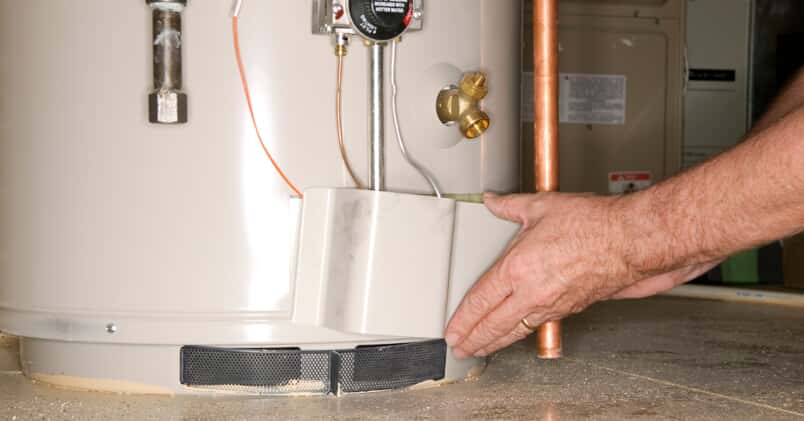Encountering a puddle of water surrounding your water heater can evoke a sense of unease. It’s a common occurrence in many households, yet it often leaves homeowners with a sense of concern and confusion. Why is this happening? Is it a trivial issue or a harbinger of a larger problem?
These questions are typical when faced with a leaking water heater. Recognizing the significance of a properly functioning water heater in your everyday routine, this article aims to elucidate the possible reasons behind leaks in water heaters.
We will delve into potential issues and discuss appropriate measures to address them. Whether it’s a minor fix or an indicator of a more significant issue, this article aims to provide clarity and insight into your water heater’s mysterious puddle problem.
Common Causes of Water Heater Leaks
When it comes to water heater leaks, several common culprits could be at play. Understanding these can help in diagnosing and addressing the issue more effectively. The following are five prevalent reasons behind water heater leaks:
1. Loose Drain Valve
The drain valve, situated at the foundation of your water heater, holds significant importance in both regular maintenance and the drainage procedure. With time and usage, it can loosen, resulting in a gradual leak. To fix this, check if the valve is indeed loose and gently tighten it with a wrench, being careful not to overtighten.
If tightening doesn’t stop the leak, the valve might need replacement, which is usually a simple task that can be accomplished with basic tools. Nevertheless, if you lack confidence in handling this task independently, it is advisable to seek assistance from a professional.
2. Too Much Pressure
Water heaters are engineered to operate within a designated pressure range. Excessive pressure, often caused by high temperature settings or a faulty pressure relief valve, can lead to leaks as a safety precaution.
To address this, first check and adjust the temperature setting to around 120-130 degrees Fahrenheit. If the temperature is not the issue, inspect the pressure relief valve. It’s essential for safety and should be replaced if malfunctioning. Replacing a pressure relief valve is a technical task and might require professional assistance to ensure correct and safe installation.
3. Corrosion
Corrosion stands out as one of the subtler causes of water heater leaks. Over time, the water tank can suffer from the gradual degradation of its material, especially if it’s not maintained properly. This corrosion can lead to the development of small cracks or holes, from which water can seep out.
The best way to combat this is through regular maintenance and inspection. If you observe indications of corrosion, it may be opportune to contemplate replacing the tank. It’s also a good idea to check the anode rod, a component designed to prevent corrosion, which should be replaced every few years.
4. Faulty Temperature & Pressure Relief Valve (T&P Valve)
The temperature and pressure relief valve (T&P valve) constitutes a vital safety feature in your water heater. Its purpose is to discharge water in the event that the temperature or pressure within the tank reaches unsafe levels, thereby averting potential damage or explosions. If this valve is malfunctioning, it could be releasing water unnecessarily, leading to leaks.
If you have reason to believe that the T&P valve is causing the leak, it is crucial to address the issue promptly. Replacing a faulty T&P valve is a crucial safety measure and might require professional help to ensure it is done correctly. Regular testing of this valve can help catch issues before they lead to leaks.
5. Aged Tank
The passage of time is an unavoidable factor in the lifespan of any appliance, and water heaters are no exception. As a water heater ages, its components naturally wear down, leading to potential leaks. This deterioration can be due to various factors, including the constant heating cycles, water quality, and general wear and tear of parts. When a water heater reaches a certain age, usually around 8-12 years, it becomes more susceptible to leaks and other issues.
Regular inspections can help in identifying problems early, but there comes a point when the most effective solution is to replace the aged tank. Upgrading to a newer model can be more efficient and less prone to leaks, providing peace of mind and better performance. If you’re experiencing leaks in an older water heater, it might be time to consider this option.
Grasping these prevalent causes serves as the initial step in resolving issues related to water heater leaks. Prompt identification and repair can not only save you from potential water damage but also ensure the longevity and efficiency of your water heating system.
Can I DIY Water Heater Leak Repairs?
After understanding the common causes of water heater leaks, a crucial question arises: Can these leaks be repaired through do-it-yourself (DIY) methods? The answer depends on the nature of the problem and your level of comfort with household repairs.
For simpler issues like a loose drain valve or minor adjustments to the temperature settings, a DIY approach is often feasible. These fixes require basic tools and a careful, methodical approach. For example, tightening a loose valve or adjusting the thermostat can be done with a wrench and a screwdriver, respectively.
However, when it comes to more complex problems like corrosion, a faulty T&P valve, or an aged tank, professional intervention is usually the best course of action. These issues encompass crucial components of your water heater, and mishandling them could potentially result in more substantial problems or even pose safety risks. Corrosion might indicate the need for a complete tank replacement, a task well beyond the scope of typical DIY repairs. Similarly, replacing a T&P valve requires a thorough understanding of water heater mechanics and safety precautions.
Moreover, if you are not confident in your repair skills or if the issue seems complicated, it’s always safer to consult a professional. Attempting to DIY complex repairs can result in voiding the warranty of your water heater, or worse, lead to accidents or further damage to the system.
In summary, while some water heater leaks can be addressed with DIY methods, it’s crucial to assess the complexity of the issue and your own skill level. When in doubt, or when facing intricate problems, seeking professional assistance is the recommended approach to ensure safety and the longevity of your water heater.
When to Call in Professionals for Water Heater Repairs
While certain water heater issues can be addressed with DIY solutions, there are specific scenarios where reaching out to a professional is not only advisable but also necessary.
Recognizing the appropriate moments to seek expert assistance can save you time, money, and guarantee the safety and effectiveness of your water heater repairs.
Advanced Age and Significant Corrosion
If your water heater is significantly old or shows extensive signs of corrosion, it’s time to call a professional. Older units, especially those nearing or beyond their expected lifespan, are likely to have multiple worn-out parts that require specialized knowledge for proper replacement and disposal. Similarly, extensive corrosion typically indicates a deeper issue that may involve more than just surface repairs.
Persistent Leaks or Recurring Issues
If you’ve attempted a repair and the leak persists, or if you notice recurring issues, professional intervention is crucial. Persistent or recurring problems often point to a more complex underlying issue that requires a thorough inspection and diagnosis by an expert.
Installation of Replacement Parts
Certain repairs, like installing a new T&P valve or replacing an entire water heater, require specific tools and knowledge. Professionals possess not only the appropriate tools but also a comprehensive understanding of local codes and safety standards. This is vital to ensure that your water heater operates safely and efficiently and complies with any regulatory requirements.
Safety Concerns
Water heater repairs can involve dealing with electricity, gas, and hot water, which pose significant safety risks. If you feel unsure about safely handling these components or find the repair process overwhelming, it is recommended to delegate the task to professionals. They possess the training and experience necessary to handle these potential hazards safely
Warranty Considerations
Finally, attempting specific repairs on your own may void the warranty of your water heater. Professionals understand the intricacies of warranties and can ensure that your repairs are performed in a way that keeps your warranty intact.
In conclusion, while some minor repairs can be a DIY project, complex issues, safety concerns, and warranty considerations often necessitate the expertise of a professional. When in doubt, it’s always safer and more cost-effective in the long run to seek expert assistance for your water heater repairs.
Preventive Measures to Avoid Future Leaks
Having explored when to tackle water heater leaks yourself and when to call in the professionals, it’s equally important to consider preventive measures. Implementing regular maintenance and proactive measures can significantly diminish the likelihood of future leaks and prolong the lifespan of your water heater.
Regular Inspections
Arrange for regular inspections of your water heater, preferably on an annual basis. During these inspections, examine for any indications of wear, corrosion, or leakage. Give special consideration to crucial components such as the T&P valve, drain valve, and anode rod during these inspections. Identifying issues early on can prevent them from escalating into more significant problems.
Maintain Optimal Pressure and Temperature
Verify that your water heater operates within the prescribed pressure and temperature ranges. Excessive pressure or overly high temperatures can accelerate wear and tear. Install a pressure regulator if needed, and regularly check the temperature setting to ensure it’s around 120-130 degrees Fahrenheit.
Anode Rod Replacement
The anode rod is specifically designed to inhibit corrosion within the tank. However, it degrades over time and should be replaced every few years. Keeping the anode rod in good condition is a key step in preventing corrosion-related leaks.
Water Quality Treatment
Hard water can contribute to the buildup of sediment and hasten corrosion. In areas with hard water, contemplate installing a water softener or employing alternative water treatment methods. This can help in reducing sediment buildup and prolong the lifespan of your water heater.
Professional Maintenance
While regular homeowner inspections are crucial, professional servicing of your water heater can offer a more thorough level of maintenance. A professional can perform comprehensive checks, clean sediment buildup, check and replace the anode rod, and ensure all components are in optimal condition.
By incorporating these preventive measures, you can significantly reduce the risk of future leaks and uphold the efficiency and reliability of your water heater. Remember, preventive care not only saves you from the inconvenience of unexpected leaks but also from the potential costs of major repairs or replacements down the line.
Indicators that Signal the Need for a Water Heater Upgrade
Transitioning from preventive measures to maintain your current water heater, it’s also vital to recognize when it’s time to upgrade to a new unit. While common indicators like leaks or inconsistent heating are well-known, there are lesser-discussed signs that can suggest your water heater is due for an upgrade. Recognizing these signs can empower you to make informed decisions before experiencing a complete breakdown.
Fluctuating Water Temperatures
If you start experiencing fluctuating water temperatures without any clear reason, it might indicate a failing heating element or a buildup of sediment affecting the heater’s efficiency. These inconsistencies can be a subtle sign that your water heater is struggling to perform.
Discolored Water
The presence of rusty or discolored water flowing from your hot water taps may indicate internal tank corrosion. While this may be temporarily resolved with cleaning or part replacements, persistent discoloration is a strong indicator that the tank is nearing the end of its lifespan.
Increased Energy Bills
An unexpected rise in energy bills can be linked to an inefficient water heater. As water heaters age, they frequently exert more effort to heat the same volume of water, resulting in heightened energy consumption. A new, more efficient model could reduce your energy costs.
Strange Noises
Unusual noises, such as rumbling, popping, or whining emanating from your water heater, can suggest a buildup of sediment or scaling on the heating elements. These sounds suggest that your water heater is working under extra stress, which can hasten its wear and tear.
Frequent Repairs
If you frequently find yourself calling professionals for repairs, this is a clear indication that your water heater may need an upgrade. Constant need for repairs not only becomes costly but also indicates that the unit is no longer reliable. Upgrading to a new model might be more cost-effective in the long run.
Recognizing these lesser-known signs can guide you in deciding when to invest in a new water heater. Upgrading your unit is not just about solving current issues but also about ensuring efficiency, reliability, and peace of mind for the future.
Enhance the Longevity of Your Water Heater with Steve’s Plumbing and AC Services
Comprehending and maintaining your home’s water heater can often appear to be a daunting task. However, with Steve’s Plumbing and AC Services at your side, this process becomes straightforward and stress-free. Our team, equipped with unparalleled expertise and unwavering dedication, stands ready to assist you with all your water heating needs.
Whether you’re grappling with leaks, considering an upgrade, or seeking reliable maintenance, our professionals are committed to delivering top-notch service. We believe in not just fixing immediate issues but in ensuring the prolonged efficiency and effectiveness of your water heater.
At Steve’s Plumbing and AC Services, we pride ourselves on providing a service that blends technical skill with a deep understanding of our customers’ needs. We recognize the importance of a well-functioning water heater in your daily life and strive to offer solutions that cater to both your comfort and energy efficiency.
Entrust your water heating concerns to us and experience a service that prioritizes your satisfaction and peace of mind. For comprehensive, expert care in water heater maintenance and repair, remember Steve’s Plumbing and AC Services is just a call away at (808) 563-4054. Allow us to bring enduring warmth and efficiency to your home.


